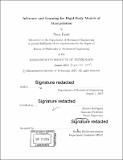Inference and learning for rigid-body models of manipulation
Author(s)
Fazeli, Nima.
Download1139337545-MIT.pdf (16.47Mb)
Other Contributors
Massachusetts Institute of Technology. Department of Mechanical Engineering.
Advisor
Alberto Rodriguez.
Terms of use
Metadata
Show full item recordAbstract
In this thesis, we explore a spectrum of inference and modeling approaches for robotic manipulation. Particularly, we investigate the broad class of rigid-bodies undergoing frictional interactions. We begin by deriving a contact-implicit system identification formulation for articulated rigid-bodies. Assuming we have a physical model of the system, the objective is to derive system parameters and contact forces for articulated rigid-bodies without enumerating and inferring contact formations. We then ground this approach by investigating the fidelity of rigid-body contact models and their identification. We evaluate the fidelity of the contact models by empirically studying their predictive performance and parameter identification properties in a planar impact task. Next, we address one approach to augmenting these contact models with data. The objective here is to improve model fidelity through an optimization of model parameters and residual error learning for systems with prior physics models. We conclude the thesis by building models from data for tasks with rich latent structure and no prior physics models. Here, the objective is to learn data-efficient hierarchical models of physics that incorporate force and tactile sensory modalities and are amenable to inference, controls, and planning.
Description
Thesis: Ph. D., Massachusetts Institute of Technology, Department of Mechanical Engineering, 2019 Cataloged from PDF version of thesis. Includes bibliographical references (pages 139-146).
Date issued
2019Department
Massachusetts Institute of Technology. Department of Mechanical EngineeringPublisher
Massachusetts Institute of Technology
Keywords
Mechanical Engineering.